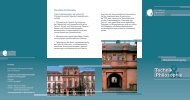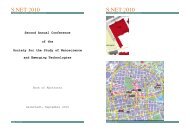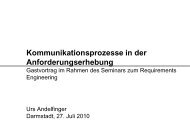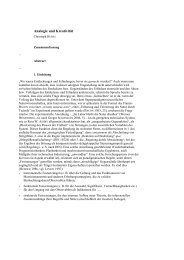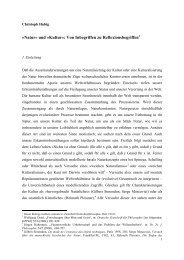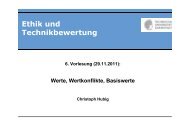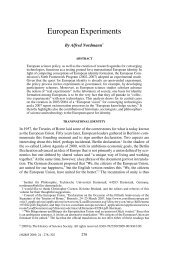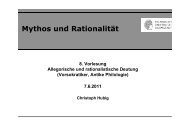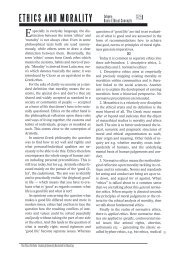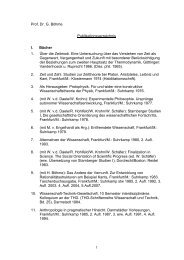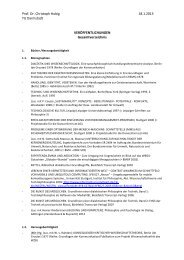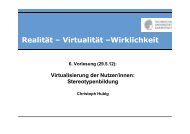If and Then: A Critique of Speculative NanoEthics - Common Sense ...
If and Then: A Critique of Speculative NanoEthics - Common Sense ...
If and Then: A Critique of Speculative NanoEthics - Common Sense ...
Create successful ePaper yourself
Turn your PDF publications into a flip-book with our unique Google optimized e-Paper software.
Nanoethics (2007) 1:31–46 39<br />
a non-improvable human nature) or one should<br />
endorse cognitive enhancement. 22<br />
Bostrom <strong>and</strong> Ord thus produce a curious reversal<br />
<strong>of</strong> the burden <strong>of</strong> pro<strong>of</strong> to promote the displacement <strong>of</strong><br />
the present by a hypothetical future. Living in the<br />
present <strong>and</strong> competing for public attention in a<br />
situation where everyone tries to discover how we<br />
might solve known problems with currently available<br />
means, one has to make one’s case: <strong>If</strong> you believe that<br />
human societies are threatened by global warming<br />
<strong>and</strong> that something should be done about this, you<br />
better produce some evidence for the reality <strong>of</strong> this<br />
threat. Bostrom <strong>and</strong> Ord reverse this burden <strong>of</strong> pro<strong>of</strong>.<br />
Those who refuse to prepare for an unknown <strong>and</strong><br />
unknowable future <strong>of</strong> cognitive enhancement are<br />
required to justify their stance, if only by demonstrating<br />
that they do not suffer from status-quo-bias. 23<br />
Such reversals <strong>of</strong> the burden <strong>of</strong> pro<strong>of</strong> are familiar<br />
from other contexts such as Creationism or Intelligent<br />
Design. Perhaps it is not necessary to adduce<br />
evidence for the claim that the doctrine <strong>of</strong> creationism<br />
is on a par with evolutionary theory. Instead, if<br />
evolutionary biologists cannot <strong>of</strong>fer absolute pro<strong>of</strong>s<br />
<strong>of</strong> their theories, they should accept creationist<br />
teaching as just another unproven theory. Indeed,<br />
Bostrom <strong>of</strong>fers in another paper just such an inference<br />
from lack <strong>of</strong> certainty to equiprobability:<br />
[...] to assume that artificial intelligence is<br />
impossible or will take thous<strong>and</strong>s <strong>of</strong> years to<br />
develop seems at least as unwarranted as to make<br />
the opposite assumption. At a minimum, we<br />
must acknowledge that any scenario about what<br />
the world will be like in 2050 that postulates the<br />
absence <strong>of</strong> human-level artificial intelligence is<br />
making a big assumption that could well turn out<br />
22 In the second part <strong>of</strong> their paper Bostrom <strong>and</strong> Ord <strong>of</strong>fer<br />
another test for status quo bias (the double reversal test). The<br />
present critique (that they are working with a false dichotomy)<br />
does not apply straightforwardly to this second test. However,<br />
the second test exposes even more clearly their utter incomprehension<br />
<strong>of</strong> approaches that are neither consequentialist nor<br />
deontological, that appreciate the historicity <strong>of</strong> the human<br />
condition <strong>and</strong> therefore cannot view the human being as a<br />
collection <strong>of</strong> parameters that either are or are not at an optimum<br />
<strong>and</strong> that can be optimized in isolation <strong>of</strong> each other.<br />
23 It should be apparent that this critique is not addressed to<br />
promoters <strong>of</strong> cognitive enhancement alone. It is directed with<br />
equal force at those who accept that burden <strong>of</strong> pro<strong>of</strong> <strong>and</strong><br />
produce lengthy arguments why we should reject such human<br />
enhancement technologies.<br />
to be false. It is therefore important to consider<br />
the alternative possibility: that intelligent<br />
machines will be built within 50 years. [5, p. 41]<br />
In other words: <strong>If</strong> we can’t be sure that something is<br />
impossible, this is sufficient reason to take its possibility<br />
seriously. 24 Instead <strong>of</strong> seeking better information<br />
<strong>and</strong> instead <strong>of</strong> focusing on the programs <strong>and</strong><br />
presuppositions <strong>of</strong> ongoing technical developments,<br />
we are asked to consider the ethical <strong>and</strong> societal<br />
consequences <strong>of</strong> something that remains incredible.<br />
Again <strong>and</strong> for the last time in this survey <strong>of</strong> examples,<br />
considerations <strong>of</strong> the present are overwhelmed by the<br />
supposed imminence <strong>of</strong> a highly speculative future.<br />
Contingencies<br />
The preceding survey <strong>of</strong> if-<strong>and</strong>-then strategies exposed<br />
the sleight <strong>of</strong> h<strong>and</strong> that is typically involved<br />
when an improbable future is presented under the<br />
guise <strong>of</strong> unflinching technology foresight. It has also<br />
touched in passing on possible elements <strong>of</strong> a more<br />
systematic analysis <strong>and</strong> rejoinder. While a comprehensive<br />
analysis cannot be developed here, it may be<br />
possible to show how ethical speculation about<br />
human enhancement technologies is framed. Indeed,<br />
such speculation gets traction from the way in which<br />
the questions about our technical future <strong>and</strong> about<br />
human change are posed. A quick analysis <strong>of</strong> these<br />
questions attempts to show that the if-<strong>and</strong>-then <strong>of</strong> the<br />
enhancement discourse presupposes a blindness to the<br />
historical contingency <strong>of</strong> the given situation in which<br />
human beings find themselves <strong>and</strong> from which alone<br />
they can embark on ethical discourse as well as on<br />
trajectories <strong>of</strong> technological development.<br />
History <strong>and</strong> Technology<br />
Günther Anders diagnosed in the 1960s a pr<strong>of</strong>ound<br />
reversal in the relation <strong>of</strong> history <strong>and</strong> technology [3,<br />
p. 73]. The development <strong>of</strong> technology used to take<br />
place within history, namely, by advancing the openended<br />
designs <strong>and</strong> interests <strong>of</strong> human societies.<br />
24 This slippage is present also in an assumption that informs<br />
many nanotechnological promises, namely the unexamined<br />
notion that what is physically possible is also technically<br />
possible (that is, one can engineer anything that does not<br />
contradict outright the laws <strong>of</strong> nature), see note 10 above.



